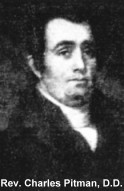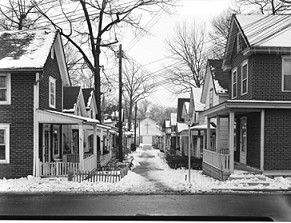
A Brief History of P I T M A N, New Jersey
Pitman is a borough, located in Gloucester County, New Jersey. It was formed from land originally located in Mantua and Glassboro Townships, and is named after Reverend Charles Pitman, D.D.
Rev. Charles Pitman was born in Burlington County, N.J. on January 9, 1796, and died January 14, 1854. He was actively connected with the ministry from 1817 to 1850 in the Methodist pastorate, as presiding elder and missionary secretary. In its early beginnings, Pitman was mostly part of Mantua Township, with some acreage in Glassboro Township. In 1871, land in this section of Gloucester County was chosen for a new Methodist summer religious camp, as it was "convenient and desirable" land, which included good sources of water.
On March 17, 1872, under the sponsorship of Reverend Perry, presiding elder of the Bridgeton District of the Methodist Church, the New Jersey Conference Camp meeting Association was formally chartered. They had the authority to adopt ordinances governing people within the bounds of their area.
The land that became known as "Pitman Grove," (most of which was west of the railroad line) was purchased in several parcels by the New Jersey Conference Camp Meeting Association. The first parcel was bought from West Jessup of Mantua Township and contained sixty acres. Later on approximately ten more acres were purchased from Joseph Jessup (just east of Broadway) in order to insure that the Camp Meeting had land between the turnpike and the railroad. Even more parcels of land were bought later and eventually the Association owned land at what was later known as Summit Avenue (east of the railroad) and extending west through the Grove section to Cedar Avenue, including a strip west of Cedar Road to Alcyon Lake (along Lake Avenue).
Pitman Grove, in Pitman, N.J.
photograph c1933At first, the only homes built on this land were for summer use, and were for the use of Methodist ministers and their families. As time passed, these families sold their buildings to persons not in the ministry.
As time passed, greater numbers of people made permanent homes. Some of the summer residents in the cottages began to stay year-round. By 1886 approximately 400 cottages were present within the Grove and in outlying areas. In 1890 the directors of the Association voted to build a drugstore on the camp grounds, and made provisions to open up additional areas for development. The permanence of the population led to the establishment of the first public school in Pitman, in a new school district, on July 17, 1884. Residents of Pitman Grove began to feel unhappy about their lack of automony, and newspapers of the time referred to issues of government, education, road conditions, tax assessment and tax collection.
The residents of Pitman Grove continued to be vocal about incorporation. On October 20, 1904, the Board of Trade called a town meeting to discuss same. 247 voters met in the Knights of the Golden Eagle Hall. Of those in attendance, 122 were for incorporation, and 35 against. The Board of Trade appointed a committee to petition the Legislature for an act of incorporation, including I.W. Newkirk, J.M. McCowan, J.C. Rulon and more. Issues arose with Glassboro Township over the proposed boundary lines, especially in the Glen Lake and Pitman Hills sections. To settle that dispute, and go forward with incorporation, eventually the new borough contained mostly land originating from Mantua.
On February 29, 1905 the Borough Committee met with the Legislative Committee on Boroughs to finalize the incorporation proposal. That Committee included those named earlier plus: Harmon Dilks, Jr., S.P. Clark, R.M. Shoemaker, William Kerns, John Sayres, and Charles Kemmerer.
Pitman officially incorporated as a borough on May 24, 1905 when Governor Edward C. Stokes signed the Avis Bill.In the 1888 George Washing Carr purchased 192 acres of land (including what was known as Wyne's Mill Pond) and with his brother, Dr. Henry H. Carr formed a partnership to run what would become Alcyon Park. Dr. Henry Carr, whose house on Broadway was built in 1908 by W.A. Lacy, became the site of the Broadway Theatre. He gave the name "Alcyon" to the Lake and Park, [He dropped the "h" from the word "halycon" because it was easier to pronounce] when it was opened in 1892. Over time Alcyon Lake and Park included a lake for fishing and boating, a boardwalk, bath house, merry-go-round, bowling alleys, casino, roller-skating rink, and other asmusement rides. In July 1905, a sham naval battle, "The Fall of Port Arthur," was performed on Alcyon Lake by the "cottagers." Grange Fairs were also held at this location in the 1920's which included endurance auto driving. Horse racing was held here in the 1930's. During the 1930's attendance dropped. On July 7, 1945 the Park which had been taken over for tax liens, was sold at public auction for $5,200.
The Pitman Grove area of Pitman Borough is on the New Jersey and National Registers of Historic Places. American Memory describes this area as "A large auditorium, the focal point of the religious activity, is at the center of the meeting ground. Narrow walkways radiate from the central common space, and are lined with small cottages which were constructed soon after 1871 to provide temporary accomodations for those people attending the meetings. Some of these cottages were built by the Camp Meeting Association and rented to the summer residents while otehrs were built by private individuals on rented lots. In later years, the houses were equipped for permanent occupancy, and although the camp meeting is still active, the residents need not have religious affiliation."
For additional history, visit the Pitman Library, and the Gloucester County Historical Society.
MORE Pitman History
- History of Pitman NJ - from official borough web site [scroll down]
- Brief History of Pitman Grove Camp Meeting (& photo)
- Article (Courier Online) about Pitman Grove (& photo)
- Alcyon Park History | Alcyon Speedway History
Pitman Photographs
- SEE Photographs page
- HABS Survey with photographs
Pitman Links:
- The Official Pitman Borough web site
- Current map, statistics and demographics - from citydata.co
- Brief history and current description of Pitman NJ - personal web site [popups]
- Pitman School District
- Pitman High School web site
- Pitman NJ - geography, demographics, statistics

Reference | Photographs | Contact | Site Map
Copyright © 2003-2020 | Janice A. Brown | All rights reserved.

